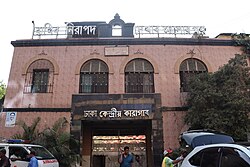Dhaka Central Jail was the largest jail in Bangladesh, located in the old section of Dhaka, the country's capital. The jail has been used to house criminals as well as political prisoners, especially during the Language Movement of 1952, the 6 Point Movement, and the Bangladesh Liberation War.
 Main gate of Dhaka Central Jail, Old Dhaka, Bangladesh | |
 | |
| Location | Nazimuddin Road, Chawkbazar, Old Dhaka |
|---|---|
| Coordinates | 23°43′07″N 90°23′53″E / 23.7186°N 90.3981°E |
| Status | Unknown |
| Security class | Maximum |
| Capacity | 2500 |
| Opened | 1778 |
| Closed | 2016 |
| Former name | Dhaka Central Jail |
| Managed by | Bangladesh Jail |
| City | Dhaka |
| Country | Bangladesh |
However, the jail earned infamy after the killings of four political leaders — A. H. M. Qamaruzzaman, Tajuddin Ahmad, Syed Nazrul Islam and Captain Muhammad Mansur Ali — on the eve of a military counter-coup on November 3, 1975, against the regime of president Khondaker Mostaq Ahmad and army chief Ziaur Rahman, which had seized power on August 15 after the assassination of Sheikh Mujibur Rahman. The slain leaders are mourned by many supporters in Bangladesh today, with the date informally known as "Jail killing day."
History
editBefore British rule, there was a Mughal fort at the site of the current jail. In 1788,[1] the fort was renovated, and converted into a jail. Until 1836, the Kotowali Police station was also co-located here. Records from 1833 show that the capacity of the jail at that time was 800 inmates. However, the jail had an average of 526 inmates every day. The Dhaka jail was converted into the central jail for East Bengal.[2] After the proclamation of Bangladeshi Independence by Sheikh Mujibur Rahman in 1971, pro-independence guards working at the jail freed inmates from the prisons, prompting the Pakistani army to attack and take control of the jail. After the establishment of Bangladesh, the prison returned to its original form.[1]
A jail museum was opened here in 2013 and the following year it was included under the Bangladesh National Museum.[3] In 2015, a ruin from the period of Muslim rulers was found in the prison area, and the following year, an archaeological excavation was undertaken.[4] The jail has been shifted to the new Dhaka Central Jail, Keraniganj in July, 2016.[5][6] In 2017 a project was undertaken to preserve the prison grounds for historical needs. The design by Form Three Architects was finalized in a competition held for the proposed project and work on the project was inaugurated in 2019. According to the design, a cultural center and multipurpose complex will be constructed and in the prison area. Two museums are included in the proposed plan.[7]
Notable inmates
editIn popular culture
editA Bangladeshi TV series, Karagar was shot at this former jail in 2022.[8]
See also
editReferences
edit- ^ a b Roni, Amanur Rahman (30 July 2016). "ঘটনাবহুল ঢাকা কেন্দ্রীয় কারাগারের ২শ' বছর". Bangla Tribune (in Bengali). Retrieved 21 June 2024.
- ^ Muntasir Mamun, "Dhaka: Smriti Bismritir Nogori", 3rd edition, 4th reprint, Ananya Publishers, Dhaka, ISBN 984-412-104-3 page 89.
- ^ "আট বছরেও উন্মুক্ত হয়নি কারা স্মৃতি জাদুঘর". Kaler Kantho (in Bengali). 3 November 2022. Retrieved 21 June 2024.
- ^ Sarker, Tarun (11 April 2021). "চকবাজার জেল: ধ্বংসাবশেষের নিচে পুরোনো ঢাকার ইতিহাস". The Daily Star (in Bengali). Retrieved 21 June 2024.
- ^ "Dhaka jail prisoners shifted to Keraniganj jail". 30 July 2016. Retrieved 25 September 2017.
- ^ "Dhaka Central Jail to be shifted to Keraniganj by June". 28 January 2015. Retrieved 25 September 2017.
- ^ "বিনোদনকেন্দ্র হচ্ছে ঢাকার পুরোনো কেন্দ্রীয় কারাগার". Khoborer Kagoj (in Bengali). 29 December 2023. Retrieved 21 June 2024.
- ^ Joya, Sharmin (23 August 2022). "Is 'Karagar' another landmark for OTT?". Daily Star. Archived from the original on 25 August 2022. Retrieved 25 August 2022.